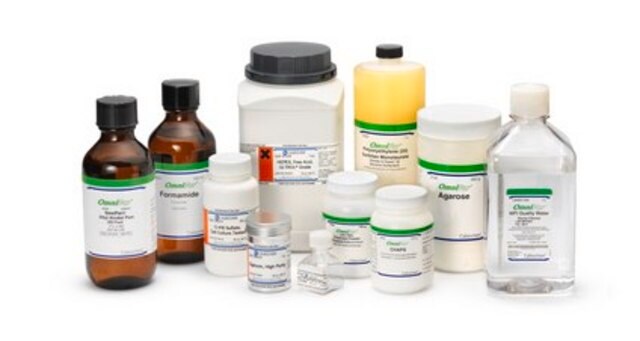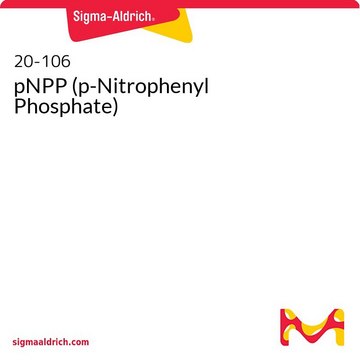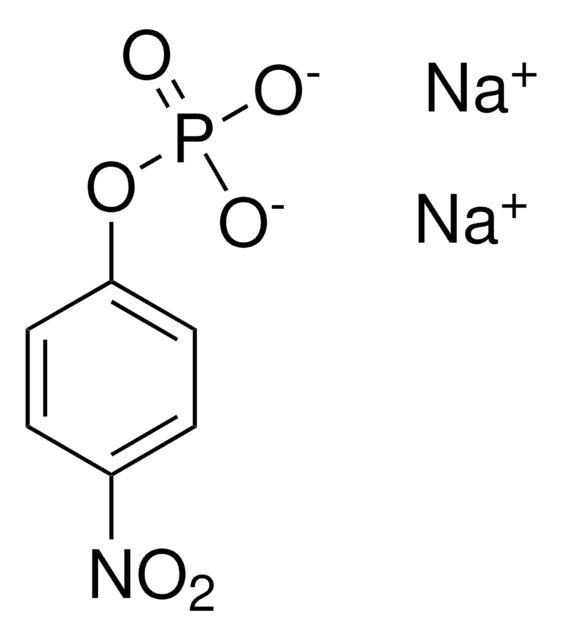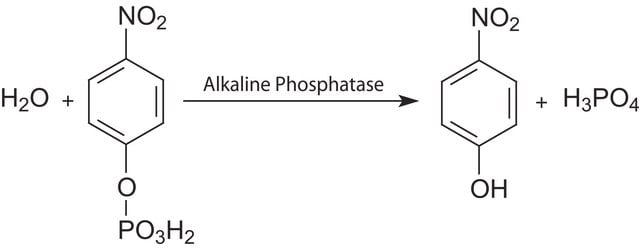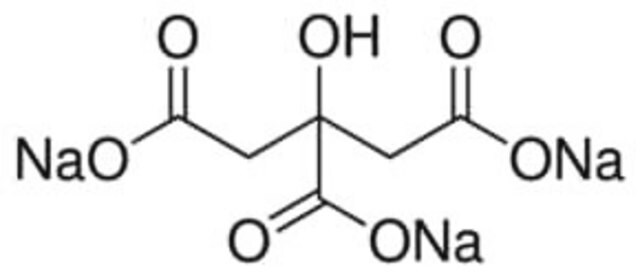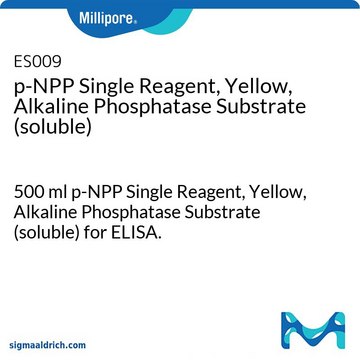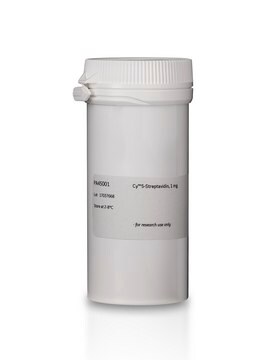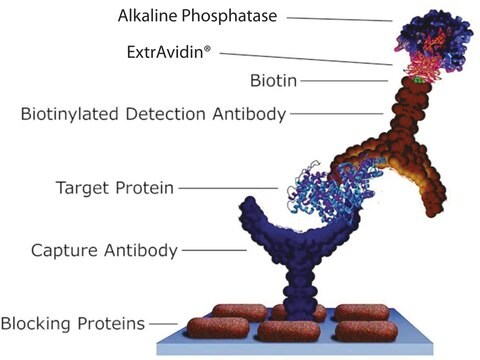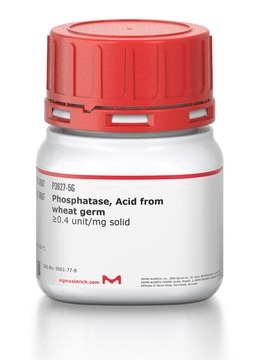487664
p-Nitrophenyl Phosphate Substrate Buffer
This p-Nitrophenyl Phosphate Substrate Buffer is validated for use in ELISA.
Se connecterpour consulter vos tarifs contractuels et ceux de votre entreprise/organisme
About This Item
Code UNSPSC :
41116158
Nomenclature NACRES :
NA.77
Produits recommandés
Niveau de qualité
Stérilité
non-sterile
Forme
liquid
Fabricant/nom de marque
Calbiochem®
Conditions de stockage
OK to freeze
protect from light
Couleur
clearlight yellow
Conditions d'expédition
wet ice
Température de stockage
2-8°C
Catégories apparentées
Description générale
Alkaline phosphatase substrate buffer supplied as ready-to-use. A diluent for Cat. No. 487663.
This p-Nitrophenyl Phosphate Substrate Buffer is validated for use in ELISA.
Application
ELISA (see comments)
Actions biochimiques/physiologiques
Primary Target
Alkaline phosphatase substrate buffer
Alkaline phosphatase substrate buffer
Product does not compete with ATP.
Avertissement
Toxicity: Standard Handling (A)
Autres remarques
Product tested for stability at 4°C, 18-26°C, and 37°C. Product performance is tested on the final product by ELISA.
Suggested procedure for use of p-NPP in alkaline phosphatase-based ELISAs:
1. To 39 parts distilled water add 1 part 50X p-NPP Concentrate (Cat. No. 487663) and 10 parts p-NPP Substrate Buffer. Mix well and store protected from light. This diluted reagent is suitable for up to 10 h after preparation.
2. Complete all required incubations with antibodies and alkaline phosphatase-labeled probes.
3. Wash plate wells at least 4 times with Tris-buffered saline (TBS) containing 0.1% Tween®-20 detergent. DO NOT USE PHOSPHATE BUFFERS; inorganic phosphate is a potent inhibitor of alkaline phosphatase.
4. After the final wash, shake and blot all residual buffer from the wells.
5. Add 100 µl of 1X p-NPP Substrate Solution to each well and incubate for 15-60 min. (If a kinetic study is desired, readings at 405 nm may be taken at intermediate intervals).
[Note: Optimal incubation times may vary depending on the amount of enzyme present. If color develops too quickly, dilution of the probe, antibody, or alkaline phophatase-labeled reagent may be required.]
6. Stop the reaction by adding 100 µl of 1 N NaOH.
7. Read absorbance at 405 nm.
Note: Variations in time, reagent volumes, and temperature may require further standardization by the user.
Suggested procedure for use of p-NPP in alkaline phosphatase-based ELISAs:
1. To 39 parts distilled water add 1 part 50X p-NPP Concentrate (Cat. No. 487663) and 10 parts p-NPP Substrate Buffer. Mix well and store protected from light. This diluted reagent is suitable for up to 10 h after preparation.
2. Complete all required incubations with antibodies and alkaline phosphatase-labeled probes.
3. Wash plate wells at least 4 times with Tris-buffered saline (TBS) containing 0.1% Tween®-20 detergent. DO NOT USE PHOSPHATE BUFFERS; inorganic phosphate is a potent inhibitor of alkaline phosphatase.
4. After the final wash, shake and blot all residual buffer from the wells.
5. Add 100 µl of 1X p-NPP Substrate Solution to each well and incubate for 15-60 min. (If a kinetic study is desired, readings at 405 nm may be taken at intermediate intervals).
[Note: Optimal incubation times may vary depending on the amount of enzyme present. If color develops too quickly, dilution of the probe, antibody, or alkaline phophatase-labeled reagent may be required.]
6. Stop the reaction by adding 100 µl of 1 N NaOH.
7. Read absorbance at 405 nm.
Note: Variations in time, reagent volumes, and temperature may require further standardization by the user.
Informations légales
CALBIOCHEM is a registered trademark of Merck KGaA, Darmstadt, Germany
TWEEN is a registered trademark of Croda International PLC
Certificats d'analyse (COA)
Recherchez un Certificats d'analyse (COA) en saisissant le numéro de lot du produit. Les numéros de lot figurent sur l'étiquette du produit après les mots "Lot" ou "Batch".
Déjà en possession de ce produit ?
Retrouvez la documentation relative aux produits que vous avez récemment achetés dans la Bibliothèque de documents.
Les clients ont également consulté
Notre équipe de scientifiques dispose d'une expérience dans tous les secteurs de la recherche, notamment en sciences de la vie, science des matériaux, synthèse chimique, chromatographie, analyse et dans de nombreux autres domaines..
Contacter notre Service technique